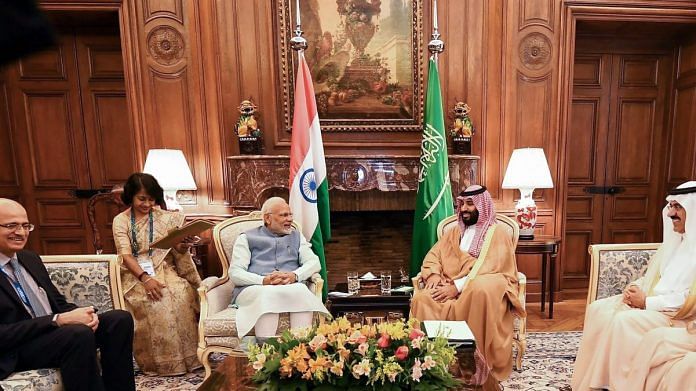From Home Minister Amit Shah’s disparaging comments describing Bangladeshis as “termites” to Bharatiya Janata Party MP Tejasvi Surya equating the Muslim invasion of India to the Holocaust to BJP spokespersons Nupur Sharma and Naveen Jindal insulting Prophet Muhammad — India’s image as a unique, multi-ethnic and multi-religious democracy is at serious risk.
At last count, Qatar, Kuwait, Iran, Pakistan, Saudi Arabia, Oman, the UAE, Jordan, Bahrain, Maldives, the Organisation of Islamic Cooperation (OIC) and Indonesia had condemned the derogatory remarks against the Holy Prophet made by the two BJP politicians about 10 days ago. Even the Taliban did not spare India.
As if this wasn’t enough, the Akshay Kumar-starrer Samrat Prithviraj, which was released to much fanfare last week with none other than Amit Shah attending the premiere with his entire family, is being banned by Kuwait and Oman.
The Ministry of External Affairs (MEA) has scrambled to damage control the backlash by describing Sharma and Jindal as “fringe elements” who did not represent the views of the Narendra Modi government. But except for striking at the OIC, which the MEA accused of making “motivated, misleading and mischievous statements,” it has more or less held its tongue.
Taking a beating before the world
There is shame and acknowledgement inside the Indian government that the ruling BJP hasn’t been able to control some of its loudmouths; that this is having an impact not just on domestic politics but also on India’s painstakingly built reputation of being a secular State. In the 75th year of its Independence, India’s self-image as a power to reckon with has taken a big beating. Fact is, the hate speech and tweet by the two BJP politicians was in the public domain for several days before the Arab world got involved — the action was taken only when one Muslim nation after another began to scold India.
Significantly, the Indian diaspora in the Arab world, as many as 18 million people, seem to be a worried lot. Several belong to the working class, having polished the shining cities of the Gulf with the sweat off their backs, but many others are very much a part of the elite in those nations. The unstated fear that they could become outsiders or that the bonds of trust they have forged with the Arab elite over decades could fray is entering their worldview for the first time.
Also read: A few Islamic nations forced Modi govt to do what 200 million Indian Muslims couldn’t
Mending ties through the years
Ironically, the two Modi governments have moved heaven and earth these last eight years to improve ties with several Gulf nations. Saudi Arabian crown prince Muhammed bin Salman Al Saud was a treasured guest in February 2019, warmly welcomed by Prime Minister Narendra Modi with his trademark embrace. Qatar is believed to have significant security cooperation with India. PM Modi has invested enormously in improving India’s ties with the UAE — it has even helped the Emirati royalty save face by preventing a Dubai princess, Latifa, from entering India and returning her to her father.
The Arab world responded with a great deal of affection. Trade with the six Gulf States is soaring with India importing $110.73 billion worth of goods in FY 2020-2021, of which Saudi Arabia took the lion’s share at $43 billion. India depends hugely on the oil economies of Saudi Arabia — and earlier, Iran — to sustain itself. Qatar is its leading supplier of Liquefied Natural Gas (LNG). At least two-thirds of India’s $85 billion remittances from abroad come from the Gulf. A free trade agreement with the six Gulf Cooperation Council (GCC) States is on the cards. The UAE reciprocated the services of the large Indian community by building a spanking new temple, which PM Modi inaugurated during his 2018 visit to Abu Dhabi.
But the BJP politicians’ remarks have lit a fire across the Arab world. The region is gobsmacked that India, with a 200-million community of Muslims of its own, can allow this kind of hate speech to rule the airwaves.
Also read: Go beyond Nupur Sharmas, Jindals—BJP needs to course-correct before 2024 Lok Sabha polls
Lined up ‘fiascos’
In an interview with ThePrint, Talmiz Ahmad, former ambassador to Saudi Arabia, Omar & UAE, said that India crossed a red line when it allowed the Holy Prophet to be criticised. A former ambassador to the UAE and Egypt, Navdeep Suri, remembered that Tejasvi Surya had — in 2015 and again in 2019 — taunted Arab women about their alleged lack of sexual prowess. A former ambassador to Syria and an old Arab hand, Rajendra M. Abhyankar, referred to Surya’s recent comment in Australia likening the Muslim invasion of India to the Holocaust and asked why MPs were not “properly trained” before they were given political clearance and allowed to travel abroad.
In the aforesaid interview, Suri also described the events as a “diplomatic fiasco”. Abhyankar remembered that the 1992 Babri Masjid demolition had stirred the Muslim world in similar ways, but the Grand Mufti of Syria understood his explanation of this being a one-off event that has slipped out of the government’s control. However, Talmiz Ahmad said the current normalisation of hate against the Muslim community was a far cry from what had happened in 1992.
India’s image as a soft power has been considerably damaged by these careless comments. But instead of applying salve on the injury, pro-BJP trolls on social media have only fanned the flames. Certainly, the Modi government is hoping the worst is over. Moreover, the events of the past few days have been an important reminder of the seamless interconnectedness of the world.
Ironically, it is the Arab world – littered with autocracies and undemocratic regimes – that has taught the Modi government a lesson in communal harmony even as it celebrates India’s 75th birthday.
Jyoti Malhotra is a senior consulting editor at ThePrint. She tweets @jomalhotra. Views are personal.
(Edited by Humra Laeeq)



